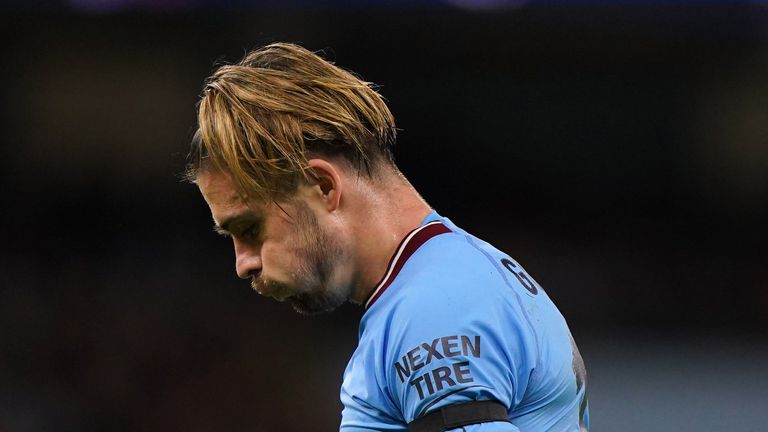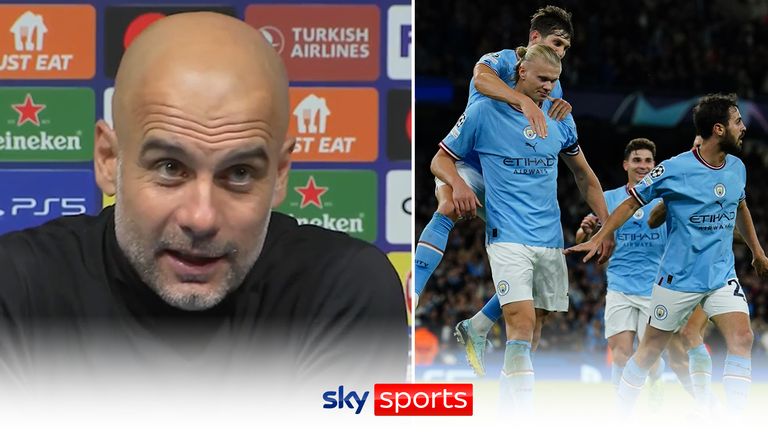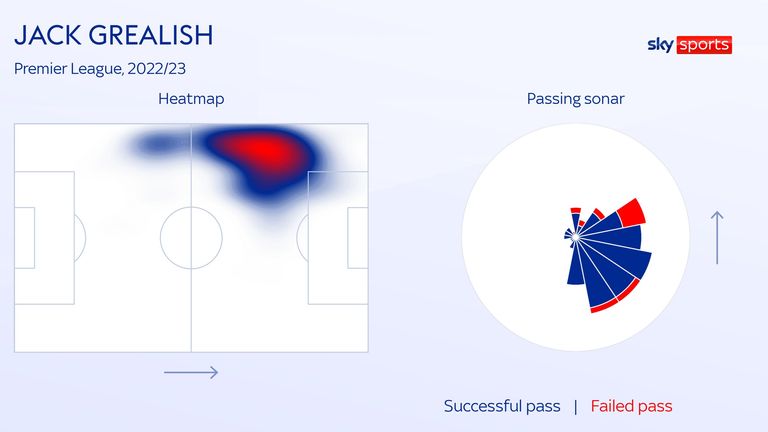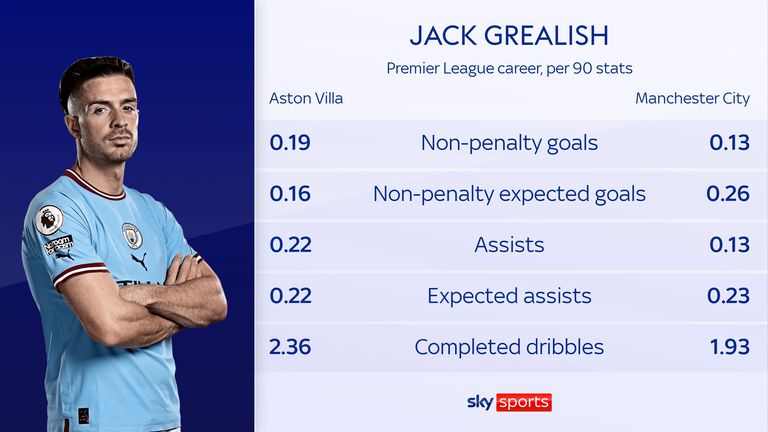Jack Grealish's Man City form: Winger remains too passive in possession for Pep Guardiola's side and has to improve
Manchester City's comeback against Borussia Dortmund came after Jack Grealish had been substituted and questions remain about how he fits into this Pep Guardiola team
Saturday 17 September 2022 14:25, UK
There was a point during the first half of Manchester City’s win over Borussia Dortmund when the space that the home side had been seeking for much of the evening had presented itself at long last. This was the moment they had been playing for.
Having finally manoeuvred the ball into the feet of Erling Haaland, the forward turned sharply and fizzed a pass out to Jack Grealish in the left channel. The winger was now free because of Haaland's habit of drawing defenders towards him.
Unfortunately, one touch became two and the space was shut down. City settled for a corner. In the end, it was barely a half chance. Grealish had not exactly messed up the opportunity but there was a sense that he had failed to maximise it.
The same might be said of his Manchester City career so far. A Premier League title winner in his first season, Grealish is World Cup-bound in his second. City are favourites to retain their domestic crown and to add that European one at long last. Questions remain.
His own contribution continues to feel a little underwhelming and the statistics never seem to do his reputation any favours. He is yet to score this season. If it feels early to consider that a valid criticism, do note that nine City players have managed to do so.
Trending
- Transfer Centre! Trent, Rashford, Olmo latest
- Littler crushes MVG to become youngest World Darts champion
- Littler thrashes Van Gerwen to win first world title | Final highlights
- PL Predictions: Expect the unexpected... Man Utd to win at Anfield?
- Liverpool latest: What do Salah's latest comments mean?
- Salah wants 'special' Premier League win in 'last year' at Liverpool
- 'It's a possibility' - Amorim doubles down on Man Utd relegation comments
- Man Utd latest: Rashford set to miss Anfield trip due to 'illness' says Amorim
- Papers: Liverpool tracking Forest's Anderson
- Arsenal latest: Just signing a striker isn't enough to win title - Arteta
Grealish's total of three league goals in 28 appearances last season was one fewer than central defender Aymeric Laporte and only more than Ferran Torres - a player who had made his final Premier League appearance for the club by this time last year.
Raheem Sterling and Gabriel Jesus have moved on - 30 goals in all competitions between them last season - and though Haaland should cover that on his own there is still an expectation that Grealish shows improvement in his second season as a City player.
The £100m fee is not his fault but the competition is his problem. He has been fine. But when trying to follow Sterling and with Phil Foden waiting his turn on the bench, fine is not going to be good enough to play when it matters in Pep Guardiola's City side.
Foden provided more evidence of that with the urgency of his cameo against Dortmund. Suddenly there was an energy in the team as he drove at the defence with purpose. City were behind and chasing the game at that point but the difference was still stark.
"We had a lot of problems to get our rhythm," Guardiola explained. "We were so passive in our transition, our movements to be aggressive. We struggled. We were playing in the wrong gear." That only changed once Foden, Julian Alvarez and Bernardo Silva came on.
"The dynamic of Phil and Bernardo and Julian did us good and gave us another rhythm. This is who we are." He was not aiming those comments specifically at Grealish but there are times when the winger comes to embody City at their slowest tempo.
Grealish keeps the ball well. But it is all so safe. Often it can appear as though his chief role is to hug the touchline, making the pitch as wide as possible so that Joao Cancelo can find an extra yard of space in that channel from which he is able to do so much damage.
Guardiola alluded to this last season when discussing Grealish. "Sometimes maybe he has to be a more aggressive guy," he said. "But the decision-making, to take an extra pass, it is not wrong. It is good. He creates space for the guy who got the ball from him."
There is joy to be had in creating space for Cancelo. After Grealish went off, it was his outside-of-the-boot assist for Haaland's winner. It is a little ironic that Guardiola suggested afterwards that Cancelo is inclined to try to do too much with the ball.
"Every ball he has, he has to make this kind of actions. I know he can do it. He does it a lot. But you cannot force it. Sometimes he does it quite often. But he is still young." So, Cancelo tends to try that final pass too much and Grealish does not try it often enough.
Guardiola no doubt admires that ability to retain the ball in tight areas. Sometimes it can seem as if Grealish will only surrender possession at a time of his choosing - whether that is a cross, a shot or a tumble that buys a free-kick. Otherwise, he could keep it forever.
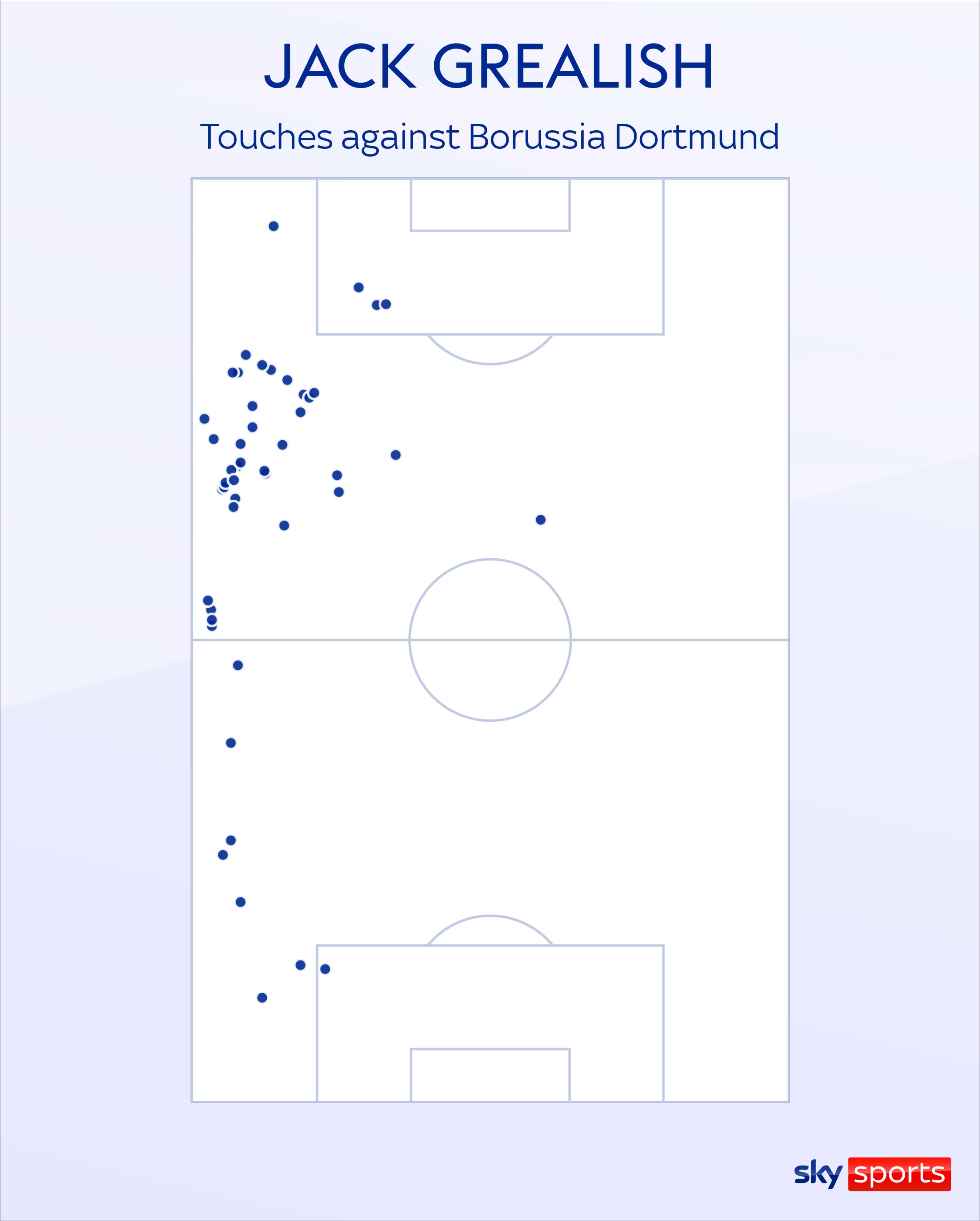
But there is still an onus on him to do more with the ball than he is doing. Look at the positions in which he received it against Dortmund. These were areas of the pitch where a world-class player might be expected to hurt the opposition far more than he did.
Grealish did not complete a single dribble.
His off-the-ball running is never likely to match Sterling and Jesus, whose runs in behind were so important for City. Their wastefulness was often criticised but the chances kept coming. Grealish is a different type of player. He must make his impact with the ball.
The assumption when he arrived from Aston Villa was that he would revel in a possession team because he would see much more of it. That has not proven to be the case. In fact, Grealish had more touches of the ball per 90 minutes at Villa than he does at City.
He was among those surprised by that.
"I have found it a lot more difficult than I thought I would," he said himself last season. "At first I thought I would have more of the ball, get more assists and goals but it doesn't work like that at all. I have had nowhere near as much of the ball as I used to get at Villa."
He does have the ball in the opposition penalty box more often now. But that only makes it more alarming that his goals and assists are down. In part, that is as a result of poor finishing by him and others - his expected goals and assists figures are actually higher.
Against Dortmund, he had three shots. As many as Haaland on the night. All of them were blocked. It sums up what we have seen from him so far. Unlucky? Perhaps. But the sympathy will soon run out unless he can do more when the moments come his way.

